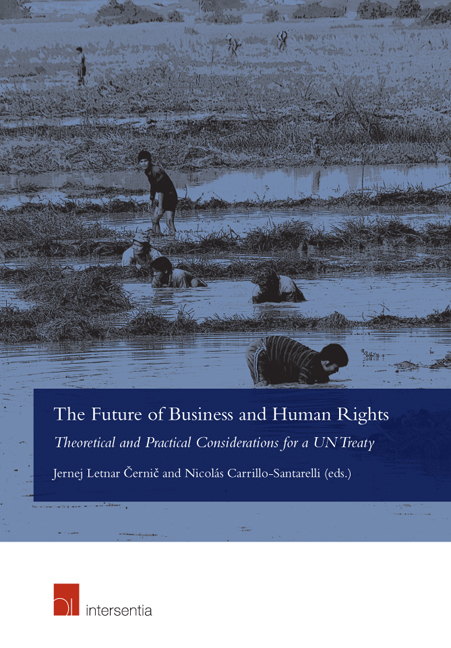Book contents
- Frontmatter
- Dedication
- Acknowledgements
- Contents
- About the Contributors
- Introduction
- Part I The Convenience and Possibility of Adopting a Treaty on Business and Human Rights
- Part II Critical Analyses Of A Treaty On Business And Human Rights
- Part III Regional Approaches
- PART IV Lessons from other Regimes of International Law
- Conclusion
- Index
Introduction
Published online by Cambridge University Press: 11 October 2018
- Frontmatter
- Dedication
- Acknowledgements
- Contents
- About the Contributors
- Introduction
- Part I The Convenience and Possibility of Adopting a Treaty on Business and Human Rights
- Part II Critical Analyses Of A Treaty On Business And Human Rights
- Part III Regional Approaches
- PART IV Lessons from other Regimes of International Law
- Conclusion
- Index
Summary
What is the future of business and human rights? Would a treaty on business and human rights bring added value to the victims of corporate human rights abuses? The idea that it is important to adopt a treaty on business and human rights has been discussed in civil society and academic circles for quite some time. For instance, several years ago, two human rights law professors suggested that the proposed World Court of Human Rights had jurisdiction over corporations. Aspirations on the codification and development of business and human rights standards came closer to become a legal reality after the formal proposal for the negotiation of a treaty on business and human rights was presented by the delegations of Ecuador and South Africa in the September 2013 session of the Human Rights Council, when they submitted a statement aimed at the adoption of ‘an international legally binding instrument, concluded within the UN system, which would clarify the obligations of transnational corporations in the field of human rights, as well as of corporations in relation to States’. Almost, a year later, on 26 June 2014, the UN Human Rights Council adopted, with a majority vote, a resolution establishing ‘an open-ended intergovernmental working group on a legally binding instrument on transnational corporations and other business enterprises with respect to human rights; whose mandate shall be to elaborate an international legally binding instrument to regulate, in international human rights law, the activities of Transnational Corporations and Other Business Enterprises’.
Yet, unlike other experiences that were propelled by civil society, such as the ones leading to the adoption of the Rome Statute of the International Criminal Court, the Convention on the Rights of the Child, or the Ottawa Convention on the Prohibition of the Use, Stockpiling, Production and Transfer of Antipersonnel Mines and on their Destruction, the project of a business and human rights treaty has neither been successful yet nor without controversy, even among its supporters. For starters, not everyone is convinced that the treaty should regulate direct corporate obligations, with some considering that it is preferable to focus on States to avoid what they perceive as risks emerging from an alternative approach.
- Type
- Chapter
- Information
- The Future of Business and Human RightsTheoretical and Practical Considerations for a UN Treaty, pp. 1 - 10Publisher: IntersentiaPrint publication year: 2018



